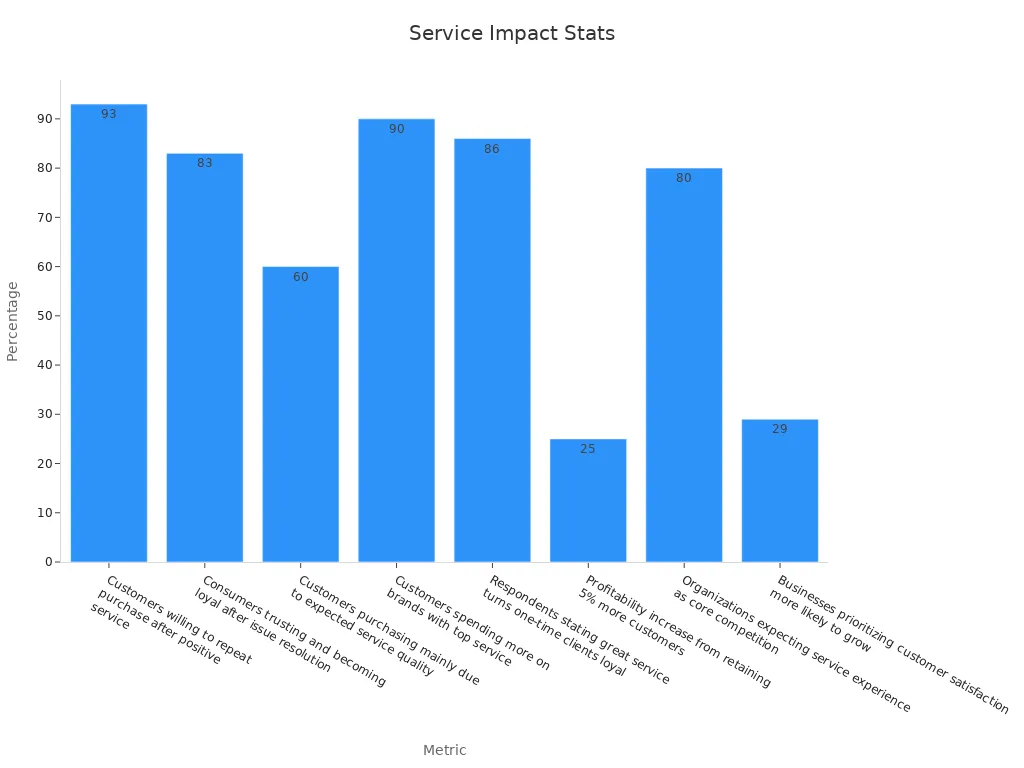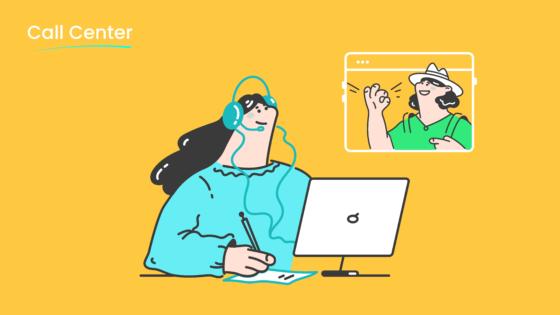Exploring the Benefits of Good Customer Service in Hospitality

Excellent customer service shapes every guest’s impression in the hospitality industry. Hotels, restaurants, and resorts that deliver excellent customer service see direct gains in loyalty, satisfaction, and profitability. For example, 93% of guests return after positive service, while 61% leave after poor experiences. The benefits of good customer service extend beyond satisfaction—businesses with excellent customer service report higher retention, stronger reputations, and increased revenue. Modern solutions like Sobot and Sobot AI help teams deliver excellent customer service, streamline operations, and elevate customer experience. The hospitality and customer service connection remains essential for businesses seeking long-term growth.

Benefits of Good Customer Service
Excellent customer service stands as the foundation of success in the hospitality industry. Hotels, resorts, and restaurants that prioritize guest needs see clear advantages. The benefits of good customer service include increased guest satisfaction, higher customer loyalty, and more positive word-of-mouth. These factors help businesses attract and retain customers, driving repeat business and long-term growth.
Attracting New Guests
Guests often choose where to stay or dine based on service quality. Research shows that 52% of guests consider good service the main reason for returning to a hotel. Simple actions like a smooth check-in or prompt housekeeping make a strong impression. When guests feel valued, they share their experiences online and with friends, creating positive word-of-mouth that attracts new guests.
A report from EHL Insights highlights that 73% of companies with above-average customer experience outperform their competitors financially. This data proves that excellent customer service is not just about making guests happy—it also brings financial rewards. Hotels that use technology, such as Sobot’s omnichannel solution, can unify guest communications and deliver fast, personalized service. This approach helps businesses stand out in a crowded market and attract new guests who seek memorable experiences.
Online reviews play a major role in guest decisions. About 81% of people read reviews before booking. Positive feedback about excellent customer service encourages others to visit. Brands that focus on customer satisfaction and seamless service delivery see more bookings and higher revenue. Sobot’s unified workspace and AI-powered tools help hospitality teams respond quickly and efficiently, ensuring every guest receives the attention they deserve.
Retaining Loyal Customers
Retaining loyal customers brings lasting value to hospitality businesses. Loyal guests return often and spend more than new customers. Data shows that loyal customers in hospitality spend 67% more than first-time guests. They also cost less to retain, making them a valuable asset for any hotel or restaurant.
Loyalty programs and personalized service foster strong relationships with guests. These programs reward repeat business and encourage guests to return. A 5% increase in customer loyalty can boost profits by 25% to 85%. This impressive growth comes from both repeat business and referrals, as loyal guests often recommend their favorite places to others.
Hospitality and customer service teams that use guest data can personalize offers and experiences. Sobot’s solutions enable businesses to track guest preferences and automate follow-ups, making every interaction feel special. This attention to detail builds lasting relationships and increases customer satisfaction.
Loyal guests become brand ambassadors. They share their positive experiences, bringing in new guests through referrals. Hotels that invest in excellent customer service see higher lifetime value from each guest and enjoy steady revenue growth. Sobot’s AI-driven analytics help teams understand guest behavior, improve service, and maintain high standards across every touchpoint.
Customer Satisfaction in the Hospitality Industry

Personalization and Attention
Customer satisfaction stands at the heart of the hospitality industry. Guests expect more than basic amenities; they want excellent customer service that feels personal and attentive. Research from McKinsey shows that 80% of guests are more likely to purchase from companies that offer personalized experiences. Cornell Hospitality Research found that a 5% increase in customer retention, often driven by personalized service, can boost profits by 25% to 95%. Hospitality Technology’s 2022 study reported a 7.8-point rise in guest satisfaction scores when hotels used personalized services like mobile check-in and digital room keys.
A large-scale study confirmed that both actual and perceived personalization improve customer satisfaction and influence guests’ future choices. Hotels and resorts that use guest data to tailor experiences see higher satisfaction and loyalty. Sobot’s omnichannel solution helps hospitality teams track guest preferences and deliver personalized service across every touchpoint, making each guest feel valued.
Personalized attention transforms a simple stay into a memorable experience, building lasting relationships with guests.
Fast and Friendly Support
Excellent customer service in the hospitality industry means responding quickly and with a positive attitude. Guests want fast answers and friendly support when they have questions or concerns. Studies show that increasing customer retention by just 5% can raise profits by 25% to 95% (Harvard Business Review). Satisfied guests complain less and return more often, which lowers operational costs and boosts loyalty.
Many leading brands, such as Marriott International and Four Seasons, focus on excellent customer service to maintain high guest satisfaction and strong reputations. Key metrics like Guest Satisfaction Score (GSS) and Net Promoter Score (NPS) help measure the impact of fast and friendly support. Sobot’s unified workspace and AI-powered tools enable teams to respond quickly, resolve issues efficiently, and ensure every guest receives excellent customer service.
| Relationship Studied | Key Finding |
|---|---|
| Customer satisfaction → Financial performance | Customer satisfaction has a significant positive impact on financial performance in hospitality. |
| Employee satisfaction → Financial performance | No direct significant impact; the relationship is indirect and mediated by customer satisfaction. |
| Employee satisfaction → Customer satisfaction | Positive relationship; satisfied employees tend to create satisfied customers. |
| Service-profit chain framework | Satisfied employees lead to satisfied customers, which drives profitability and market share. |
| Managerial implication | Investing in employee and customer satisfaction is critical for business success in hospitality. |
Enhancing Customer Experience with Sobot
Unified Communication Channels
Sobot’s omnichannel solution transforms customer service in hospitality by unifying all guest interactions into a single, easy-to-manage workspace. Hotels and restaurants often face challenges when guests reach out through different channels like phone, email, chat, or social media. Sobot brings these channels together, allowing teams to deliver a seamless customer experience. This unified approach helps staff coordinate better, respond faster, and avoid confusion.
65% of customers want their issues resolved in their preferred communication channels. They expect smooth coordination and continuity, whether they use SMS, email, chat, or voice. Sobot’s platform captures guest preferences and ensures every interaction feels consistent and personal.
A unified system also builds trust. When teams share information across departments, guests receive accurate and timely responses. Brands that use unified communication channels see higher loyalty and increased spending. Sobot’s solution reduces operational complexity, making customer service more efficient and reliable.
AI and Automation in Service
Sobot leverages AI and automation to boost customer service efficiency and improve the overall customer experience. The Voice/Call Center uses AI-powered voicebots and intelligent routing to handle routine inquiries, freeing up agents to focus on complex guest needs. Automation speeds up response times and ensures guests receive help around the clock.
Recent studies show that AI and automation in hospitality can reduce labor costs by 4.2%, cut overtime expenses by 31%, and decrease scheduling errors by 41%. These improvements lead to better staffing, lower costs, and a 14% increase in positive guest reviews. Sobot’s AI-driven tools help teams manage workloads, automate repetitive tasks, and deliver fast, friendly customer service.
The real-world impact is clear in the Weee! customer story. Weee! used Sobot’s voice product to overcome language barriers and time zone challenges. With a flexible IVR system and multilingual support, agent efficiency increased by 20%, and resolution time dropped by 50%. Customer satisfaction soared to 96%, showing how Sobot’s technology can transform customer service and customer experience in hospitality.

Building Reputation and Trust
Positive Reviews and Word-of-Mouth
Excellent customer service shapes how guests talk about a hotel or restaurant. When guests receive excellent customer service, they feel valued and appreciated. This feeling leads to positive reviews and positive word-of-mouth. Studies show that a satisfied guest will tell about nine people about their experience. These stories spread quickly, helping businesses attract new guests and build a strong reputation. Positive reviews appear on travel sites, social media, and booking platforms. Each positive review acts as a recommendation, encouraging others to visit. In hospitality, excellent customer service often leads to positive reviews being shared three times or more. This ripple effect increases bookings and revenue. Sobot’s unified communication tools help teams respond quickly and resolve issues, making it easier to deliver excellent service and earn positive reviews.
Outstanding customer service creates trust and loyalty, making guests more likely to recommend the business to friends and family.
Consistent Service Quality
Consistency is key in hospitality. Guests expect excellent customer service every time they visit. When hotels and restaurants deliver consistent, excellent customer service, they build trust and long-term relationships. Research shows that consistent experiences across all channels increase customer loyalty. For example, a quick-service restaurant improved its customer experience scores by 4 percentage points after focusing on consistency. This improvement led to better financial results. Data from Grand View Research highlights that loyal customers have conversion rates between 60% and 70%, much higher than new customers. Loyalty programs and emotional connections also play a big role. Companies with strong emotional ties to guests see sales growth 85% higher than competitors. In practice, keeping experienced staff helps maintain service quality. Gallup found that a 10% rise in employee engagement can boost guest satisfaction by up to 22%. Sobot’s omnichannel solution supports teams in delivering consistent, excellent customer service, helping businesses retain guests and strengthen relationships.
Operational Efficiency in Customer Service
Streamlined Workflows
Operational efficiency in hospitality depends on streamlined workflows. Automation and digital tools help teams deliver excellent customer service by reducing manual tasks and improving coordination. Hotels and restaurants now use integrated property management systems to automate room booking, check-in, billing, and inventory. These systems free staff to focus on guest needs and provide excellent customer service.
- Automation in housekeeping sends instant notifications when rooms are ready, speeding up cleaning response.
- Room service robots deliver amenities directly to guest rooms, reducing wait times.
- Online booking platforms show real-time availability, making reservations faster.
- Contactless payments speed up transactions and reduce delays.
- AI-driven staff scheduling matches workforce levels to peak hours.
- Real-time communication tools, like chatbots and mobile notifications, resolve guest issues quickly.
| Metric | Statistic / Impact |
|---|---|
| Average Issue Resolution Time | Reduced by 24% after integrated communication platform implementation |
| First-Contact Resolution Rate | Increased by 18% |
| First Response Time (FRT) | Key metric measuring time from inquiry to first acknowledgment |
| Service Level Agreements (SLAs) | Predetermined response time targets tracked and optimized |
Sobot’s omnichannel solution and Voice/Call Center unify guest communications, automate routine tasks, and help teams deliver excellent customer service efficiently. These tools support hospitality businesses in meeting service level agreements and improving guest satisfaction.
Data-Driven Insights
Data-driven insights play a key role in improving customer service performance in hospitality. Hotels and resorts use AI-powered analytics to identify what matters most to guests and make better decisions. For example, Customer Alliance’s AI Hub analyzes guest feedback from surveys and booking platforms to highlight factors that drive satisfaction and bookings. Early adopters of these tools report measurable gains in guest satisfaction and increased bookings.
- A global hotel chain used data analysis to cut energy use by 15% and boost guest satisfaction by 20% in six months.
- Resorts reduced over 20 performance metrics into core components, enabling faster decisions and better staff scheduling.
- A boutique hotel matched housekeeping schedules to guest check-out patterns, reducing cleaning delays by 30%.
- Service centers predicted equipment failures, cutting downtime by 25% and lowering repair costs.
Sobot’s unified workspace and analytics dashboard give hospitality teams real-time data on guest interactions, helping them spot trends, optimize workflows, and deliver excellent customer service. By using these insights, businesses can improve operational efficiency and create memorable guest experiences.
Practical Steps for Better Customer Service
Staff Training and Empowerment
Hospitality businesses achieve better results when they invest in staff training and empowerment. Ongoing training programs help employees develop customer service skills, product knowledge, and upselling techniques. These programs also boost confidence and job satisfaction. A recent study showed that service knowledge and self-efficacy increase after training, leading to improved guest interactions.
| Outcome Measure | Evidence Summary |
|---|---|
| Service Knowledge | Grows steadily after training, showing skill improvement. |
| Self-Efficacy | Rises with training, reflecting greater confidence and empowerment. |
| Job Satisfaction | Increases, linking training to better well-being and motivation. |
| Customer Interaction | Empowered staff deliver higher service quality and guest satisfaction. |
Error management training gives employees the tools to handle service mistakes with confidence. When staff feel empowered, they respond to guest needs quickly and fairly. Managers can encourage ownership by recognizing staff efforts and giving them resources to solve problems on the spot. This approach leads to more positive guest experiences and stronger team morale.
Tip: Regular feedback sessions and role-playing exercises help staff practice real-life scenarios and improve their response to guest needs.
Leveraging Technology
Technology plays a vital role in modern hospitality. Hotels and restaurants use digital ordering systems, mobile check-in, and contactless payments to speed up service and reduce errors. Over 62% of hoteliers now use cloud-based property management systems to streamline reservations and billing. AI-powered chatbots, like those in Sobot’s omnichannel solution, provide instant guest support and free up staff for more complex tasks.
- Service robots deliver food and clean rooms, helping with staff shortages.
- IoT-enabled smart rooms let guests control lighting and temperature from their phones.
- Automated systems track guest preferences, making personalized service easier.
Sobot’s unified workspace and AI-driven tools help teams manage guest interactions across all channels. These solutions improve operational efficiency and ensure guests receive fast, friendly service. Early adoption of technology not only boosts efficiency but also attracts tech-savvy guests and strengthens brand reputation.
Note: Technology should enhance, not replace, the human touch. Staff must combine digital tools with personal attention to create memorable guest experiences.
Hospitality businesses that prioritize good customer service see higher guest satisfaction, loyalty, and profitability. Tracking KPIs like occupancy rate and customer loyalty helps hotels improve customer experience and stay competitive. Real-time data and integrated platforms, such as Sobot’s omnichannel solution, empower teams to deliver excellent customer service and adapt quickly to guest needs. Investing in customer service drives long-term growth. Now is the time for every hospitality leader to make customer service a top priority and create memorable guest experiences.
FAQ
What is the most important benefit of excellent customer service in hospitality?
Excellent customer service in hospitality increases customer satisfaction and loyalty. According to Harvard Business Review, a 5% increase in customer retention can boost profits by up to 95%. Satisfied guests return and recommend the business to others.
How does Sobot help improve customer experience in hospitality?
Sobot provides unified communication channels and AI-powered tools. These features help hospitality teams deliver fast, personalized support. Sobot’s solutions increase agent efficiency and reduce response times, leading to higher customer satisfaction and excellent customer service.
Why do positive reviews matter for hospitality businesses?
Positive reviews build trust and attract new guests. Research shows that 81% of travelers read reviews before booking. Excellent customer service leads to more positive feedback, which increases bookings and improves the reputation of hospitality businesses.
Can technology replace human interaction in customer service?
Technology, like Sobot’s omnichannel solution, supports staff by automating routine tasks. However, human interaction remains essential for building relationships and delivering excellent customer service. The best hospitality businesses combine digital tools with personal attention.
What metrics should hospitality businesses track to measure customer satisfaction?
Key metrics include Net Promoter Score (NPS), Guest Satisfaction Score (GSS), and first response time. Sobot’s analytics dashboard helps hospitality teams monitor these metrics, identify trends, and improve customer experience through data-driven decisions.
Tip: Regularly review customer feedback and adjust service strategies to maintain excellent customer service in hospitality.
See Also
Top Strategies For Selecting Social Media Support Tools
Ways Chatbots Enhance Satisfaction In Online Shopping
Improving Customer Support Efficiency With AI Solutions
